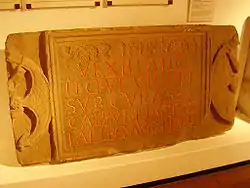Sextus Calpurnius Agricola
Sextus Calpurnius Agricola was a Roman senator and general active during the 2nd century. He was consul suffectus with Tiberius Claudius Julianus for the nundinium of September-October 154.[1] Agricola is known primarily from inscriptions.
Sextus Calpurnius Agricola | |
|---|---|
| Allegiance | Roman Empire |
| Years of service | c.150-c.170 |
| Rank | Legate consul suffectus, imperial legate, Governor |
| Commands held | Germania Superior Dacia Moesia |

Life
No information has yet been found about Calpurnius Agricola prior to his consulate. His origin is attested in no surviving document, and the gentilicium "Calpurnius" is commonly found all over the Empire. However, Anthony Birley notes the combination "Sextus Calpurnius" is very uncommon, and he suggests that Agricola is related to Fronto's friend Sextus Calpurnius Julianus; if so, he may have been a native of Cirta or another town in Numidia.[2]
Calpurnius Agricola was governor of Germania Superior around 158.[3]
In 161 or 162 he was made governor of Britain and remained until at least 163, possibly until the end of the 160s.[3]
In 163, he was sent to Britain to control uprisings in the north. He rebuilt a number of forts, most notably that at Coria (Corbridge). He withdrew troops southwards from Scotland towards the line of Hadrian's Wall to contend with the threats of further rebellion.[4]
There are indications of unrest in Britain around the time of his rule attested by damage to the forum at Viroconium Cornoviorum (Wroxeter) and the burning of a large part of Verulamium (St Albans).[5][6]
Around 166 AD Agricola was appointed imperial legate in Roman Dacia.[7] Between 168 and 169, he was one of the governors of Lower Moesia.
Notes
- AE 1980, 760
- Birley, Fasti of Roman Britain (Oxford: Clarendon Press, 1981), p. 127
- Patricia Southern, Roman Britain: A New History 55BC - AD 450
- RIB 1127, 1149, cf. 1389
- Robin George Collingwood, John Nowell Linton Myres Roman Britain and the English Settlements p.150
- Historia Augusta Life of Marcus Aurelius 8.8
- Birley 2000, p. 145.
Sources
Secondary
- Patricia Southern, Roman Britain: A New History 55BC - AD 450
- Birley, Anthony (2000). Marcus Aurelius. Roman imperial biographies. London and New York: Routledge. ISBN 978-0-415-17125-0.CS1 maint: ref=harv (link)
| Political offices | ||
|---|---|---|
| Preceded by Marcus Valerius Etruscus (?), and Lucius Aemilius Juncus (?) as consules suffecti |
Suffect consul of the Roman Empire 154 with Tiberius Claudius Julianus |
Succeeded by Gaius Julius Statius Severus, and Titus Junius Severus as consules suffecti |
| Preceded by Marcus Statius Priscus |
Roman governors of Britain 161- later in the 160s |
Succeeded by Unknown, then Quintus Antistius Adventus |